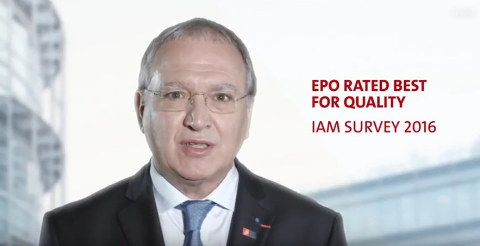

THE concept of patents is pretty much universal, but not all patents are created equal. There are different sorts of patents ("families") pertaining to or belonging to different domains. Speaking of them all as though they're the same is the recipe for meaningless debates. Not all patents, for example, are a matter of life or death. Ethical aspects apply in some cases; sometimes pure economics.
"Not all patents, for example, are a matter of life or death."As we discovered quite recently, EPO oppositions can crash companies. In other words, wrong decisions (or intentions) to grant can be truly harmful and pretty awful to workers. Things get pretty freaky when patents are being claimed on life itself. Forward Pharma lost 30% of its value (or valuation) in just one day at the end of January. This was due to an EPO decision. Yes, some sectors are over-reliant on patents; there's no question about it. Here's an example from two days ago: (in the UK)
Shares in Scancell Holdings PLC rose sharply on Friday morning as the company said its Moditope immunotherapy platform is to be granted a European patent.
Scancell shares were up 11% on Friday at 13.54 pence per share.
"What we have here is a cross-continental fight taken up to the ITC and failing, having heavily relied on a patent from the USPTO."Pacific Biosciences is meanwhile attempting to 'compete' by causing embargo of its rival, Oxford Nanopore. We wrote about it some days ago and received plenty of comments from people involved in this matter. It's yet another one of those ITC examples where patent litigation is geared towards embargoes and bankruptcies, not innovation. Here is what the face-saving press release said (striving to justify waste of shareholders' money, spent on litigation). This campaign of patent litigation by Pacific Biosciences backfired pretty badly. "Pacific Bio down 2% premarket on ITC patent ruling," Wall Street media stated shortly thereafter. To quote: "The ITC interpreted the term "single-molecule sequencing" as limited to sequencing-by-synthesis approaches, determining that Oxford's sequencing approach is not "single-molecule sequencing.""
What we have here is a cross-continental fight taken up to the ITC and failing, having heavily relied on a patent from the USPTO.
We have become increasingly supportive of the USPTO because it continues to deny patents on life and even software patents. PTAB helps and gravitates towards that. See the latest PTAB Life Sciences Report by John Cravero and Pharma Patents Blog writing about 35 U.S.C. ۤ 101 rejections (not just based on Alice but also Mayo):
We’ve written previously about ex parte decisions of the Patent Trial and Appeal Board (PTAB) affirming patent eligibility rejections that seem to be inconsistent with the USPTO’s Subject Matter Eligibility Guidance. Apparently, applicants should be wary about appealing any rejection of a diagnostic method claim, because the PTAB may enter sua sponte patent eligibility rejections even if the examiner did not make a €§ 101 rejection.
In the litigation, Hospira argued both (1) that the MedCo patents were invalid and (1) that Hospira’s proposed generic Angiomax drug would not infringe. The district court sided with MedCo on the first point (patents not invalid) but with Hospira on the second (patents not infringed). On appeal, the Federal Circuit has affirmed the non-infringement ruling but reversed on the on sale issue. The interesting portion is the on sale question.
"They get what they paid for. It's pure lobbying/marketing."As one can expect, the litigation 'industry' isn't particularly happy about that. Many patents are being invalidated, which must be causing decrease in demand for patents and lawsuits (their main "offerings" or "services" or "products").
There's a "Pharma and Biotech IP Summit" being organised by IAM and as one can expect, the bill for this lobbying event is being footed by the main participants. "Finnegan is a Gold sponsor of IAM Magazine," it says. There's therefore a paid-for 'talk' (marketing). This not only helps Finnegan control the 'debate'; it also keeps IAM on their 'good side' (maybe IAM will give Finnegan some more of these bogus 'rewards' or 'endorsements'). "Jen Roscetti will present "The View from the United States" at @IAM_magazine's #Pharma and #Biotech #IP Summit in London," Finnegan wrote the other day. They get what they paid for. It's pure lobbying/marketing.
"Either way, "Pharma and Biotech IP Summit" is an IAM sham. It's sponsored by and dominated by the patent microcosm."With all honesty, more people ought to speak out about IAM's "business model", which involves collecting cash, pushing agenda (in the form of 'news' or staged 'debates'), offering bogus 'endorsements', and issuing 'studies' for people like Battistelli (bolstering his lies). There's nothing benign about it. IAM is effectively a think tank and even some less senior insiders must have realise it. Several of them left, only to be replaced by relatively young and inexperienced writers. Tim Lince, it should be noted, is still listed as a writer at IAM, but he wrote nothing this year and only 1 (one!) blog post last year. Many writers left and perhaps associating with people Battistelli (as we last noted last night) won't save them but only cause further harm.
Either way, "Pharma and Biotech IP Summit" is an IAM sham. It's sponsored by and dominated by the patent microcosm. It's like a propaganda platform facilitated by Joff Wild and his cohorts. He did the same for UPC (with cash from the EPO's PR firm). ⬆